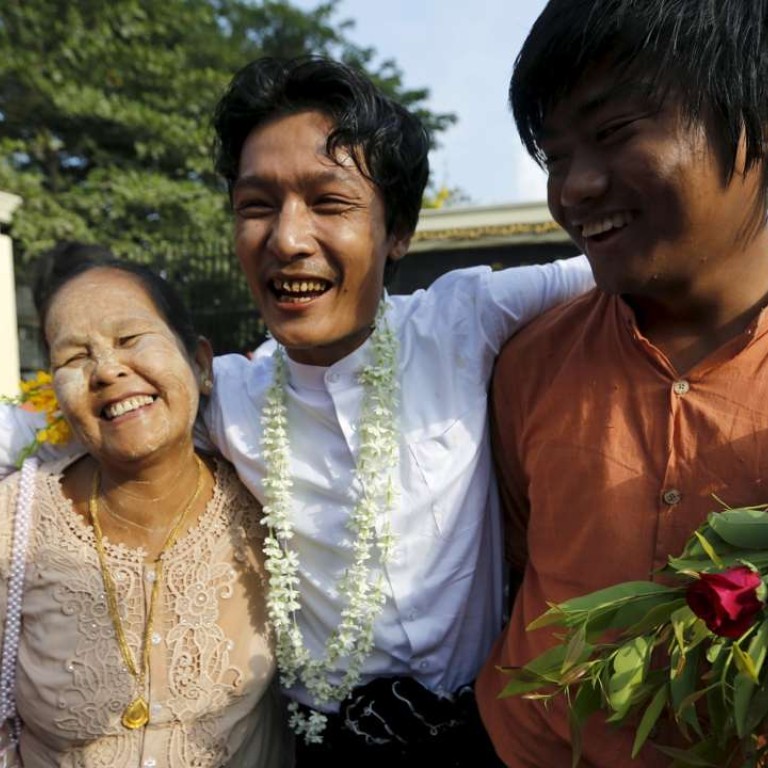
Myanmar’s new president offers amnesty to political prisoners, allowing dozens to walk free
The NLD stormed to power in national elections on November 1, displacing a quasi-civilian government.
Myanmar President Htin Kyaw pardoned dozens of political prisoners on the country’s traditional New Year Sunday, according to a watchdog group, as his fledgling civilian-led administration seeks to cast off the shackles of nearly half a century of military rule.
The new government, which is steered by veteran democracy activist Aung San Suu Kyi, has vowed to prioritise freeing the scores of political prisoners jailed by the country’s former military leaders.
“According to our documents, 63 political prisoners are released from various prisons by the amnesty of the president,” said the Assistance Association for Political Prisoners (AAPP), though it was not immediately clear how many would be permitted to leave their cells today.
A presidential pardon published Sunday morning said 83 people would be freed but it did not specify how many on the list were political prisoners.
The president’s statement, his first major political act since taking office, said the amnesty was intended to “make people feel happy and peaceful, and [promote] national reconciliation during the New Year”.
Myanmar’s nearly two-week new year holiday, a Buddhist celebration known as Thingyan, falls in mid April and sees most offices close while people line the streets to douse each other with water to wash off the past year’s sins.
We have been looking forward to hearing good news from this new government
Suu Kyi’s ruling National League for Democracy (NLD), which took power last month after sweeping historic November polls, is stacked with ex-political prisoners once jailed for their democracy activism under the former military regime.
The army’s routine jailing of dissidents was one of many repressive policies that garnered support for the party’s long democracy struggle.
Suu Kyi’s new government oversaw its first wave of prisoner releases earlier this month, when authorities dropped charges against nearly 200 political activists ahead of the New Year holiday.
Among those pardoned on Sunday were five journalists handed 10-year sentences in 2014 over a report accusing the military of producing chemical weapons – which the government denied.
The journalists’ sentence, which was later reduced to seven years, was slammed by rights groups as “outrageously harsh”.
Though the former quasi-civilian government that took over from the junta in 2011 unleashed a wave of economic and political reforms, it also threw scores of political activists behind bars.
“We have been looking forward to hearing good news from this new government,” Yarzar Oo, one of the journalists from Unity Weekly News, said after his release from Pakokku Prison in Magway region.
They were greeted with flowers by their families, who gathered at the prison the night before after catching wind of their release, the journalist said.
According to AAPP, amnesty was also granted to writer and former NLD information officer Htin Lin Oo on Sunday, who was jailed last year for “insulting religion” in a speech that criticised rising Buddhist nationalism.
Rights groups say there are still dozens of political activists serving sentences or facing trials.
Suu Kyi, who spent some 15 years under house arrest, is banned from the presidency by a junta-era charter but is guiding her party’s government through her roles as state counsellor and foreign minister.
In a New Year speech Sunday Htin Kyaw – Suu Kyi’s close friend and ally – stressed his administration’s determination to free all political activists facing prosecution.
His administration is inheriting a country in the grip of its most fundamental political transformation since the military seized power in 1962.
It will face many challenges, including a deeply flawed legal system, the continuing clout of the army, high poverty rates and civil wars in several ethnic minority states.

.png?itok=arIb17P0)